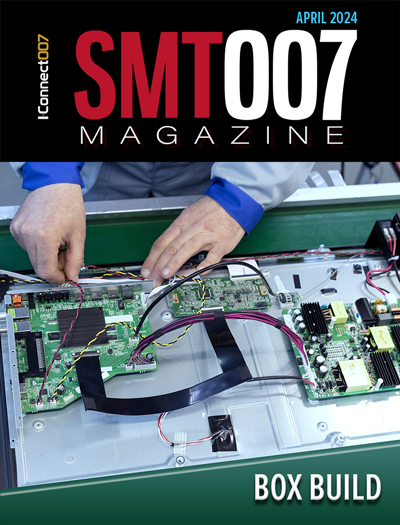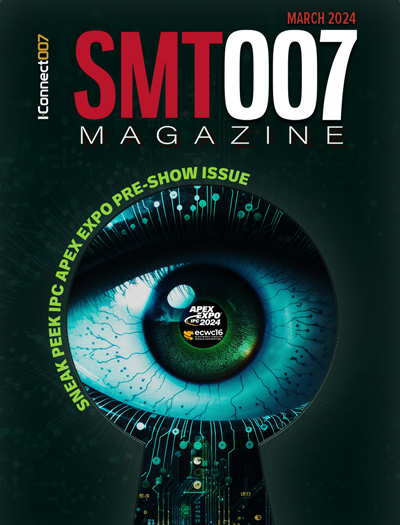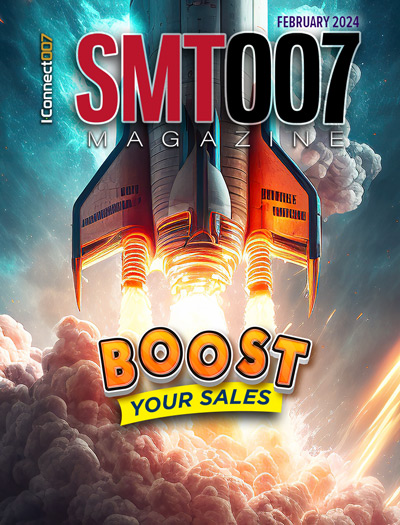-

- News
- Books
Featured Books
- smt007 Magazine
Latest Issues
Current Issue
Box Build
One trend is to add box build and final assembly to your product offering. In this issue, we explore the opportunities and risks of adding system assembly to your service portfolio.

IPC APEX EXPO 2024 Pre-show
This month’s issue devotes its pages to a comprehensive preview of the IPC APEX EXPO 2024 event. Whether your role is technical or business, if you're new-to-the-industry or seasoned veteran, you'll find value throughout this program.

Boost Your Sales
Every part of your business can be evaluated as a process, including your sales funnel. Optimizing your selling process requires a coordinated effort between marketing and sales. In this issue, industry experts in marketing and sales offer their best advice on how to boost your sales efforts.
- Articles
- Columns
Search Console
- Links
- Events
||| MENU - smt007 Magazine
Plug into the Ecosystem and Network
April 19, 2023 | Barry Matties, I-Connect007Estimated reading time: 6 minutes
Barry Matties met Wade Pinder during the Cup of Joey event at the Ion in Houston, Texas. Wade is a successful product manager and Houston-area college lecturer who likes to tell young students and industry stalwarts alike to reach out and learn from each other. He shares his thoughts on finding and hiring the right talent.
Barry Matties: Wade, it’s great to meet you. Would you give us some background on yourself?
I moved to Houston in 2008, and in 2012, I started working for a company called blinds.com in Houston. I was the product manager for its technology division, which Home Depot bought in 2014 or 2015. I stayed on with them for several years, so it's kind of a local success story.
At the time, various players in the industry ecosystem reached out to me about mentoring founders and entrepreneurs who don't understand what they are building, why they are building it, and where they want to go with it. They weren’t thinking in terms of delivering incremental value to the marketplace. I realized that I have something to contribute because product vision marks the start of a founder's journey.
Today I guest lecture at Rice University and other colleges around town. I talk to students about career paths, product ideation, or how they can market their product in ways they haven’t thought about before.
Still, I'm very careful not to call myself a mentor, even though other people may. I’ll give you an hour of my time but hand you back your problem at the end of that hour.
Hopefully, with a fresh perspective.
That's all I can offer. It is not advice. I may see something that they aren't seeing. “Here are some ways to move forward on that,” I say. “What are you going to do about it?”
I have very specific boundaries that I communicate up front. That allows me to talk to a lot of people over time. But I tell people, “I don't want to invest with you. I don't want to sit on your advisory board. I don't want to purchase your stock. Don't cut me in. I don't want any of this.”
One of the greatest struggles in our industry right now is finding great people to hire, onboard, and stay long term. What advice would you give to a company that's looking to do such things?
Plug into the ecosystem. After I've talked to someone, they often ask me how they can help. I generally tell them to just show up, at least for some event. For example, come to this Cup of Joey event here at the Ion and get exposed to what's going on in the industry. Go to a pitch competition that going on here.
We have of lot of different spaces and accelerators. Can you do it all time? No, you have a job to do. But schedule the time you're willing to engage with the community. You'll be surprised what you learn. I'd love to see us gain traction as an ecosystem in the next couple years. We graduate a lot of great students in Houston who have trouble getting into technology or wonderful companies because there's no bridge to these careers. They seek entry-level jobs elsewhere.
We need to create that on-ramp for our own talent rather than always hire from elsewhere. We need to just put some career pipelines in place. It'll become an entire networking system over time. Just show up and engage a little bit.
It’s refreshing to see so many people connecting here at the Cup of Joey and sharing ideas with really no expectations other than sharing ideas.
One thing I didn't mention: For the past four years, I have held a Houston “community of practice” for product managers. We meet the second Saturday of every month, from 9 a.m. to noon. Those who show up are passionate about their craft. We connect, learn, and share. That's it. It's just a group of people that come together to talk. Speakers need to be local to Houston. They talk less about work and more about things that build relationships. They share common interests like comic books, golfing, board games, and other things that interest them.
People can ask for advice and thoughts from people with more experience. They can commiserate with people of similar experience to help them realize they aren’t crazy because they’re going through the same struggles. They can figure things out together. People who are less experienced help pay it forward by bringing up issues that you never thought about. They challenge you in different ways and keep issues fresh and relevant.
Time box this type of networking. A good starting point is my 3-3-3 system: Try to connect with three experienced people, three people with similar experience, and three people with less experience.
I spend two hours a week adding value to people. How? By connecting with them through social media, like posting and replying to them on LinkedIn. I may make a video in the future. But proximity matters, too. You can invite them to lunch.
It sounds like you’re encouraging the making of a connection.
These connections are fluid. You flow in, and you flow out. Sometimes it doesn't work, particularly if you both are in a competitive industry. In that case, you may be better off just being aware of each other rather than focusing on nurturing that type of relationship.
Why intentionally show up and try to add value week to week? Your goal is more than the end product. Your journey doesn’t start at the end. You need to picture it and then work toward that end until you finally get there.
What if your company is not located in Houston? What would you recommend? How do they gather and create the same kind of ecosystem?
I tell people wanting to start communities to figure out their own Venn diagram. My personal one includes two circles—Houston and product—and they intersect with my personal time and community time. That’s where I add value.
That's very intentional.
Right. It involves applying product thinking to the ecosystem, and also modeling for other community leaders. Ask yourself, “Does this relationship have traction?” If not, what are the missing pieces to making an intentional connection? It’s not about selling. It's about asking people about their purpose or what drives them.
How can a corporation take this concept and bring it inside their four walls, into their culture?
They can't because, by definition, their Venn diagram automatically includes a circle for themselves. They can't escape that, but they can add plenty of value in their community.
Companies often ask, “What's in it for me? How much time, money, and energy will I need to expend on this?” But community relationships are more about learning and getting better at your craft. It’s about a company or corporate entity nurturing their community relationships. How? Hold corporate events with your product people and the community. Let people know what product positions are open by giving talks and holding panel discussions or lightning-round interviews. Recognize those who are looking for a job or those who are hiring for positions. Try to make those connections inside the community. Finally, help people get better at their craft. Help them share their vision and execute their business objectives.
You obviously have had a very successful career and it's great that you're giving back and sharing wisdom. That's so critical in today's world. Thank you for your time.
You’re welcome.
Suggested Items
Digitalisation and ESG
04/19/2024 | Marina Hornasek-Metzl, AT&SDigitalisation and ESG are prominent and high-priority topics in the global business community. The first focuses on applying technology throughout the value chain to produce faster, smarter, and more desirable business outcomes. The latter emphasises the broader value a business is expected to create for its stakeholders from an environmental, social, and governance perspective.
Real Time with... IPC APEX EXPO 2024: Looking Back, Looking Forward With IEC
04/19/2024 | Real Time with...IPC APEX EXPOIEC came to the RTW booth and discussed both the legacy of IEC's past and the vision for its future. Industry veteran Bruno Ferri highlighted his quarter-century tenure in the industry and with IEC since its founding. He still exhibits boundless enthusiasm for the industry. Brando Stone, a young professional and a future face of IEC, talked about IEC's plans going forward and his experience at this year's IPC APEX EXPO.
Seeking Employment: Meet Parker Capers
04/18/2024 | Barry Matties, I-Connect007Parker Capers, a cybersecurity professional with a decade of experience in the SMT industry, earned a bachelor’s degree from DeVry and is CompTIA Security Plus certified. He is open to various industries but has a strong affinity for manufacturing due to extensive familiarity. Parker appreciates smaller companies where personal connections matter. Are you hiring?
SEMI Applauds CHIPS Program Office Progress to Diversify U.S. Semiconductor Industry Workforce
04/18/2024 | SEMIThe SEMI Foundation, the arm of SEMI dedicated to supporting economic opportunity for workers and the sustained growth of the microelectronics industry by creating pathways and opportunities for job seekers, applauded strides made by the CHIPS Program Office to diversify the U.S. semiconductor industry workforce and its release of the First Annual Report Regarding the Opportunities and Inclusion Activities Undertaken by the Department of Commerce.
VDMA: Machine Vision Navigating Through Uncertain Times
04/18/2024 | VDMAFor over a decade, the European machine vision industry has reported steady growth, with turnover increasing by an average of 9 percent annually between 2012 and 2022. Despite a temporary setback in 2020 (minus 4 percent) due to the Covid-19 pandemic, the industry rebounded strongly in 2021 (plus 17 percent) and 2022 (plus 11 percent).


